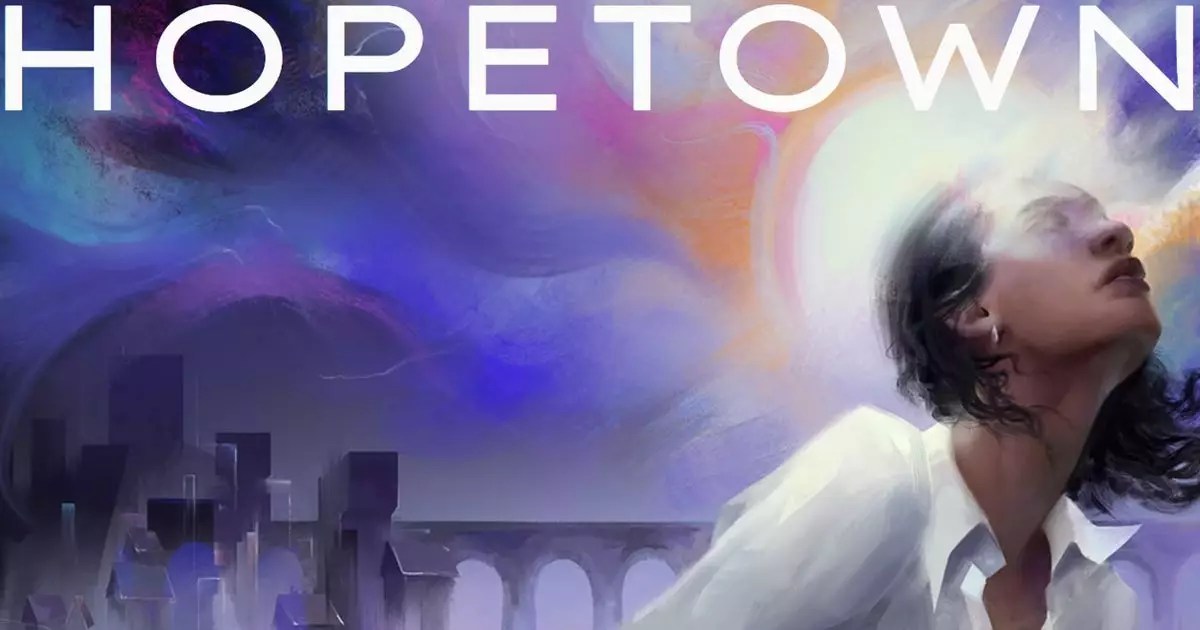The gaming landscape often thrives on the echoes of past successes, and when a title is touted as a “spiritual successor” to a masterpiece, it inevitably raises eyebrows and builds up fervent anticipation. Longdue Games is gearing up to unveil *Hopetown*, an RPG that has been touted as a blend of the emotional depth found in *Disco Elysium* and the narrative richness of *Planescape: Torment*. This lofty aspiration is fraught with expectations, but is longing for greatness setting the stage for a letdown?
Initially teasing *Hopetown* in October during “The Great Disco Thrupening,” Longdue recently shared the first gameplay image, igniting excitement across the gaming community. Visually, the game appears strikingly beautiful. The vibrant purple and yellow color palette is an intoxicating choice, coupled with a painterly aesthetic that seems almost too good to be true. It’s easy to get lost in the visual allure, but this beauty begs the question: does exquisite art translate to an equally compelling narrative experience?
Words vs. Windows: The Dilemma of Dialogue
The gameplay image reveals not just characters, but the story woven into *Hopetown*. The dialogue snippets showcased depict a protagonist engaging an elderly woman feeding pigeons, with lines that playfully revel in cynicism. Yet, this self-deprecating humor quickly raises a red flag. The character describes their behavior about personal hygiene in a tone that seems to veer into the realm of cheap shock value. There’s a fine line between witty satire and contrived controversy, and based on these early glimpses, it feels as though *Hopetown* risks teetering on the latter.
The depiction of dialogue choices also suggests a heavy reliance on shock-factor humor, possibly forgetting that meaningful character interactions often stem from deeper engagement. While *Disco Elysium* excelled at presenting quirky yet profound dialogue, *Hopetown* appears to be leaning toward a juvenile approach that may undermine its philosophical intent. When the character’s first response to an olive branch offered by the pigeon lady is to “lick the bin,” it’s telling of a potentially misguided attempt at humor rather than an invitation to reflective interaction.
The Weight of Expectations
Expectations are a double-edged sword in the gaming industry. Emerging titles that lean heavily on the legacy of previous masterpieces may face an uphill battle, as players often hold them to unrealistic standards. The descriptions of the protagonist in *Hopetown* as a “chaotic, self-destructive provocateur” suggests a profound depth, yet this characterization could easily come off as a rebellious cliché unless executed with sharp insight. As the gaming world witnessed with *Disco Elysium*, genuine poignancy often comes from richly developed characters whose narratives evolve beyond mere archetypes.
Comparisons to past titles—especially in discussing tone and complexity—can be both a blessing and a curse. While marketability thrives on familiarity, it also creates an acute sensitivity to interpretation. In this case, *Hopetown* must tread carefully to carve out its identity without being perceived as a mere reflection of its predecessor. The question isn’t if it can invoke a certain spirit but whether it can tell a new story that stands on its own.
Visual Splendor vs. Narrative Substance
Undeniably, *Hopetown* showcases an artistic brilliance that captivates the eye. But as gamers know, aesthetic appeal can mask deeper narrative flaws. The artistic style may draw players in, yet the experience ultimately relies on the richness of storytelling and character development. Visuals alone cannot adhere to the burgeoning expectations created by its spiritual heritage. The concepts and themes presented in the game must be fleshed out in meaningful ways—something *Disco Elysium* accomplished through its intricate intertwining of narrative and existential inquiry.
As developments unfold, it’s crucial for *Hopetown* to move beyond dazzling visuals and playful humor. The gaming audience seeks authenticity and depth, components that nurture a robust narrative. If the project can balance its artistic ambitions with the profound contemplations of the human experience, there might just be a path toward greatness carved from its own essence, rather than standing solely on the shoulders of giants.
In a culture that often craves originality, the path of the “spiritual successor” comes with cautionary tales. Hope rests on the ability of *Hopetown* to embrace its own voice, avoiding the trap of merely echoing the resonant tones of its predecessors. Ultimately, it’s not only about the visual journey, but the depth of the heart that accompanies it.


Leave a Reply